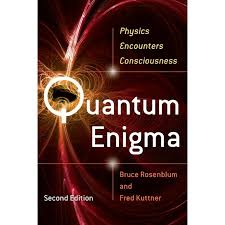Bruce Rosenblum has a BS in Engineering Physics from New York University and a PhD from Columbia University studying microwave molecular spectra. He is Professor of Physics and former Chairperson of the Physics Department at the University of California, Santa Cruz.
Fred Kuttner graduated from MIT with a degree in physics and spent several years teaching high school physics and training high school physics teachers, both in the US and with the Peace Corps in Colombia. After returning to the U.S. he got his PhD in Physics fro the University of California, Santa Cruz and his thesis was on the quantum theory of magnetic phase transitions.
Even though I have a separate page that summarizes the most important concepts about quantum physics (see Quantumphysics) that are relevant for this site I decided to create a separate page about this particular book because it is one of the most concise and simplest explanations of various quantum phenomena. I found this it easy to read although I had to go over some passages more than once since I am not a scientist. It covers concepts such as the old Universal Law of Motion based on Newton’s worldview, Schrödinger’s Equation and the new Universal Law of Motion, the Observer Problem, the EPR paradox, Bell’s Theorem and the Copenhagen interpretation. At the end of the book the authors discuss the link between quantum mechanics and consciousness.
The authors have created a website that includes a book description, a table of content with the quotes they have used for each chapter and a page titled “Enigma in a Nutshell” which I found particularly interesting. In addition the authors address the controversy of this book saying that it is “the mystery beyond the physics, that’s controversial”. The further state: “One concern is that some people, seeing the solid science of physics linked to the mystery of the conscious mind, might become susceptible to all sorts of pseudo-scientific nonsense. We physicists can also be uncomfortable seeing our discipline involved with anything so “unphysical.”
The authors provide a list of additional readings for both the general reader and advanced student and a detailed index of topics at the end of the book.
